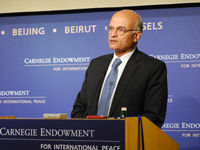Registration
You will receive an email confirming your registration.
U.S.–India relations have continued to improve since Prime Minister Manmohan Singh’s trip to the United States in November 2009. This November, President Obama will visit India as part of the continuing transformation in bilateral ties. In the second of a series of events previewing this historic trip, Ambassador Shivshankar Menon, India’s National Security Advisor, spoke at the Carnegie Endowment on the nature of the U.S.-India relationship and the challenges and opportunities faced by both countries. Carnegie’s Jessica Mathews moderated.
Shared Values
Although the relationship between the United States and India is based on a number of common interests, the two nations also share values that help nurture a unique bilateral relationship, Menon stated. As India works to transform the lives of its own citizens, the values of pluralism, democracy, tolerance, and secularism it applies in this effort are familiar to the American people.
Nuclear Liability Legislation
One major point of contention between the United States and India has been the status of legislation protecting nuclear suppliers from liability, a part of the landmark Indian-U.S. civilian nuclear agreement. Recently, the Indian parliament passed legislation designed to limit liability, but many American commentators have argued that the legislation does not go far enough and is not consistent with international norms. Menon explained that the Indian government’s lawyers believe that the legislation does not impose additional conditions or risks on the suppliers and India does not see any problems satisfying suppliers from a practical standpoint. The Indian government, he added, is hoping to discuss the legislation and the concerns surrounding it directly with American companies and reach an understanding before Obama’s visit in November.
Regional Relations
Menon spoke about some of the important regional relationships that inform India’s foreign policy and affect its interactions with the United States.
- Afghanistan: India and the United States both share the goal of a peaceful, moderate Afghanistan and work to further this goal in their own ways. India has concentrated on rebuilding the country with about $1.5 billion in commitments aimed at making a greater impact on the ground.
- Pakistan: While India is willing to enter into a discussion on any issue with Pakistan, the talks will only proceed so far as long as India faces terrorist attacks from Pakistani territory, Menon said. The democratically elected Indian government must remain sensitive to the public opinion of its citizens in this area, he added.
- Southeast Asia: An open, flexible, and inclusive regional architecture is the best choice for Southeast Asia, Menon said. Such a vision for the region would include the United States as an Asian power. In a region with such fluid power dynamics, Menon added, the architecture must have space for changing political, economic, and social circumstances and be capable of evolving.
- China: There has been a gradual appreciation of China’s currency against India’s currency, so currency value is not as significant an issue in India’s relations with China as it is for the United States. Still, Menon asserted that the value of the Chinese renminbi is an issue of global concern.
- Myanmar: India has made attempts to engage Myanmar on issues of development and to encourage Myanmar’s attempts to establish democracy in the country. The upcoming parliamentary elections in November could be a significant step in that direction, but that remains to be seen.
- Sri Lanka: Sri Lanka is in the middle of trying to repair the damage from its civil war. The country must work to reconcile various factions, effect a political recovery, and the restore its democracy, Menon said. Even in the middle of its civil war, Sri Lanka managed to maintain a democratic polity and a relatively open economy, he said.
